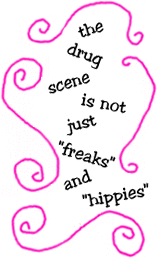 Q Dear Miss Abigail:
Q Dear Miss Abigail:
When we first met, my live-in boyfriend was a recovering heroin addict and I was in recovery (for prescription pills). He has started to use heroin again. We never have any money, and are two months behind on our rent. He just got fired yesterday because his boss was sick of him leaving everyday for a couple of hours to “COP.”
I love this man so much, but I don’t know what to do. I don’t like the life that I am leading, but I don’t know if I can just leave him all alone the way he is now.
Signed,
Confused
A Dear Confused:
Sounds like trouble to me! You obviously recognize the need to get out of this relationship, and get out fast. But first, let’s take a look at the following advice to parents of possibly troubled teens. I do believe it suggests that we are all on drugs!
1971: The Drug Scene
![]() The phrase “the drug scene” conjures up many different pictures in the minds of parents and the public in general. Some parents may visualize scenes of city areas like San Francisco’s Haight-Ashbury or New York’s East Village or Chicago’s Old Town, with young people, long-haired and bearded, lounging about the streets with nowhere in particular to go. Others may imagine scenes from the inner city’s poor and ghetto areas, where heroin addicts roam the streets.
The phrase “the drug scene” conjures up many different pictures in the minds of parents and the public in general. Some parents may visualize scenes of city areas like San Francisco’s Haight-Ashbury or New York’s East Village or Chicago’s Old Town, with young people, long-haired and bearded, lounging about the streets with nowhere in particular to go. Others may imagine scenes from the inner city’s poor and ghetto areas, where heroin addicts roam the streets.
Because many of our perceptions are formed by the media’s portrayal of events, people imagine squalid hotel rooms where a heroin addict is “taking a fix” or recording sessions where musicians are “turning on” before they begin to play. They imagine Woodstock and other rock festivals, where hundreds of thousands of young people are openly smoking marijuana.
All of these pictures are true to some extent ~ but they are false in that they portray only a small part of “the drug scene” as it actually exists in the United States today. This concept of the drug scene overemphasizes certain drugs ~ primarily LSD and marijuana ~ and the young people who use them. It underemphasizes certain other drugs ~ perhaps far more dangerous ~ and the many people, adolescents and adults, who use them. The drug scene is not just “freaks” and “hippies” and psychedelic drugs, music, and art. It is also not simply “junkies” and “pushers” and rundown ghetto neighborhoods.
The drug scene is a tense housewife, tired of the baby crying, who reaches for the bottle of tranquilizers at 4:30 in the afternoon. It is the bottle of pills in a secretary’s desk drawer, for when the pressure of work gets too great. It is the hard-driving salesman taking a couple of sleeping pills to “get a good night’s rest” before an important meeting. It is the weight-conscious woman taking dexedrine-filled diet pills and the night-driving truck driver taking a few bennies to stay awake on the road. It is the athlete taking amphetamines to be able to run faster and the student taking pills to stay awake and study. It is the busy professional man or woman taking a morning “wake-up” pill to get rid of the lethargy left from the previous night’s sedative.
The drug scene is still more ~ it is a martini at lunch and a few more to relax after work. It is a pack of cigarettes a day. It is pills to dry the sinuses and enrich the blood. It is aspirins for the headache and antihistamines for the runny nose. It is cough suppressants and “tiny time pills.”
The drug scene, then, is bourbon and gin and aspirin and Librium and Winstons and phenobarbital and Contac and Compoz, as well as marijuana and LSD and speed and heroin. It is the prevailing popular attitude that there must be a pill or a quick and easy remedy for every pain and problem, and even for the possibilities of problems.
Probably you, as a parent, and most other adults find it hard to consider a cigarette, a cup of coffee, or a tall, cool drink as a “drug.” Yet they are, for they all contain substances that alter the mind ~ nicotine, caffeine, alchohol. These drugs are just one part of the over-all drug scene in the United States ~ and in the world today.![]()
Source: Parent and Child Institute. The Life Cycle Library for Young People, Book 6: Parents’ Answer Book On Drugs. Chicago: Parent and Child Institute, 1971.
~ pp. 11-12 ~